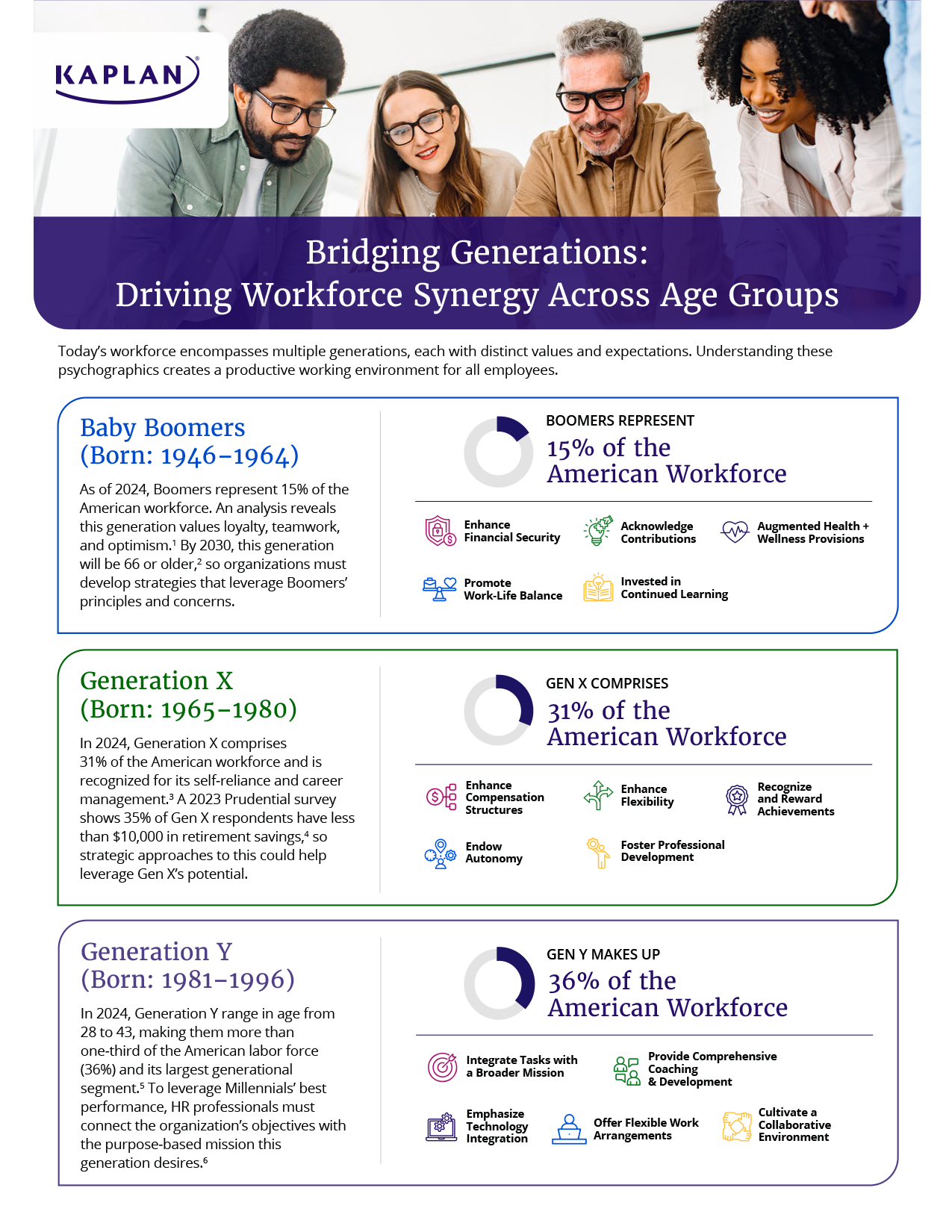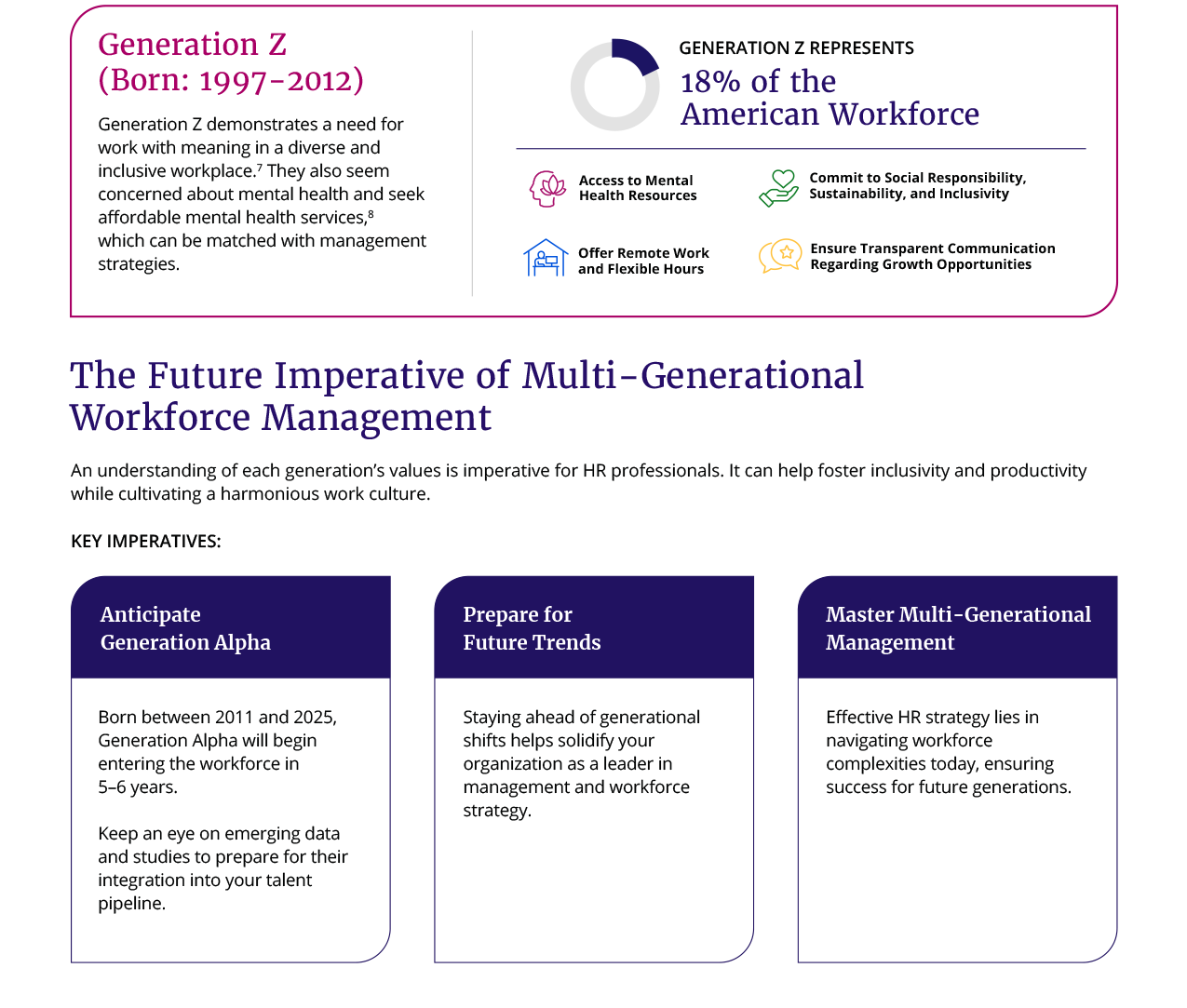
Thought Leadership
Not finding what you’re looking for?
Today's workforce is a dynamic blend of generations, each with unique experiences, values, and expectations. Baby Boomers, Gen X, Millennials (otherwise known as Generation Y), and Gen Z (or Zoomers) work side-by-side, creating a complex and evolving landscape. Understanding these generational differences isn't just an academic exercise – it's crucial for HR professionals and anyone who wants a smooth and productive work environment.
Research shows that the attitudes of each generation significantly influence workplace behaviors and expectations. These intergenerational differences are not just theoretical; they impact how organizations function and shape the corporate culture. Today’s HR professionals need to understand, acknowledge, and navigate these generational nuances to leverage the unique strengths of each group. This approach allows for better organizational synergy and improved performance for both employers and employees.
Despite increasing retirement rates, Baby Boomers remain a significant part of the workforce. As of 2024, individuals in this age group represent approximately 22% of American workers, according to data from the U.S. Census Bureau. An analysis of Boomer characteristics in the workplace reveals that this demographic is often characterized by loyalty, a strong sense of teamwork, and a generally optimistic outlook. Research also indicates that the competitive spirit and driven nature commonly associated with this generation could, in some cases, manifest as tendencies toward workaholism.1
The imminent retirement of Boomers is a major concern for both this generation and the organizations that employ them. A variety of factors influence the decision regarding the age at which individual workers choose to retire. Statistically, men tend to retire around the age of 65, while the average retirement age for women is 63. By 2030, all Baby Boomers will be 65 or older, likely resulting in a substantial exit from the workforce.2 This impending shift poses challenges for HR professionals who are responsible for managing employees in this age group. It is crucial to develop strategies that recognize and utilize the intrinsic values of this cohort while they remain active in the workforce.
Strategies for Supporting Baby Boomers:
Enhance Financial Security: Offer comprehensive retirement planning assistance and financial benefits to support their transitional phase.
Promote Work-Life Balance: Introduce flexible working arrangements, including part-time roles and phased retirement options, to accommodate their evolving personal and professional needs.
Acknowledge Contributions: Provide authentic and meaningful recognition, such as personalized gifts, to honor their contributions.
Invest in Continued Learning: Offer robust training programs and workshops tailored to their evolving interests.
Support Health and Wellness: Ensure comprehensive health benefits and wellness initiatives to support their well-being.
As of 2024, Generation X employees comprise approximately 33% of the American workforce, as indicated by data from the U.S. Census Bureau. Successful individuals from this cohort often hold pivotal leadership positions. This generation is widely recognized for its self-reliance and emphasis on pragmatic career management. Generation X is anticipated to assume the high-level leadership roles vacated by retiring Baby Boomers.
HR professionals should be aware of Gen X’s retirement concerns, particularly their apprehensions about their financial readiness for retirement. A 2023 Prudential survey revealed that 35% of Gen X respondents reported having less than $10,000 in retirement savings, while an additional 18% indicated having no retirement savings whatsoever.3 Despite the challenges and opportunities associated with managing Generation X employees, there are several strategic approaches available to leverage their potential.
Strategies for Managing Generation X:
Elevated Compensation: Given their retirement concerns, increased pay may be more effective than more intangible benefits such as an enhanced workplace culture.
Endow Autonomy: Empower them by granting decision-making latitude, aligning with their intrinsic value of self-direction.
Enhance Flexibility: Implement flexible working arrangements, including adaptable hours, remote work opportunities, and generous leave policies, to accommodate their need for work-life balance.
Foster Professional Development: Provide access to advanced training programs and clearly defined career progression pathways, catering to their aspirations for continuous professional advancement.
Recognize and Reward Achievements: Acknowledge their contributions and accomplishments through performance bonuses and other merit-based incentives, thereby reinforcing their commitment and value.
In 2024, Millennials—otherwise known as Generation Y—range in age from 28 to 43 years. Millennials represent the largest generational segment within the U.S. workforce and account for 35% of the American labor force.4
Millennials are distinguished by their pursuit of engagement, challenge, and alignment with a mission that resonates with purpose. This generational perspective necessitates that companies, organizations, and their HR professionals forge substantial connections between this cohort and overarching organizational objectives.5 Various strategic approaches have been developed to address these Millennial preferences.
Strategies for Engaging Millennials:
Integrate Tasks with a Broader Mission: Ensure that individual responsibilities connect to the overarching organizational mission. This can help foster a sense of purpose and alignment.
Offer Flexible Work Arrangements: Facilitate remote work opportunities and flexible working hours to accommodate their need for adaptability and work-life balance.
Provide Comprehensive Coaching and Development: Invest in personalized coaching and professional development programs to support growth and skill enhancement.
Cultivate a Collaborative Environment: Foster a culture of collaboration and teamwork, reflecting their preference for interactive and participatory work settings.
Emphasize Technological Integration: Utilize advanced technology to enhance productivity and innovation.
Generation Z is the youngest cohort and constitutes approximately 10% of the American workforce. While members of this generation predominantly occupy entry-level positions at present, their representation is expected to expand progressively as more individuals reach working age.
Gen Z demonstrates a pronounced inclination toward work that is meaningful and workplaces characterized by diversity and inclusivity.5 Furthermore, this generation appears to exhibit heightened concerns regarding mental health compared to prior cohorts and is more likely to seek accessible and affordable mental health services.6 Although the needs of Generation Z may appear varied, there are sophisticated management strategies designed to align with and address these generational aspirations.
Strategies for Managing Generation Z:
Provide Access to Mental Health Resources: Offer comprehensive mental health resources to support this generation’s emphasis on holistic health and psychological resilience.
Offer Remote Work and Flexible Hours: Implement remote work options and adaptable scheduling to cater to their demand for flexibility and work-life integration.
Commit to Social Responsibility, Sustainability, and Inclusivity: Demonstrate a steadfast commitment to social responsibility, environmental sustainability, and inclusivity, aligning with their values and global consciousness.
Ensure Transparent Communication Regarding Growth Opportunities: Foster an open dialogue concerning career advancement, thereby nurturing their desire for clarity and progression.
Understanding each generation's work ethic and values is a strategic imperative for today's human resources professionals. Insight into generational dynamics is vital for fostering an environment of inclusivity and productivity across all levels of an organization. By effectively overseeing the current multi-generational workforce – spanning Baby Boomers, Generation X, Millennials, and Generation Z – HR professionals can cultivate a harmonious and high-performing work culture.
Looking ahead, this knowledge serves as a framework for the future integration of Generation Alpha into the workforce. Born between 2013 and 2025, this cohort represents the next wave of talent poised to enter the labor market. Although the eldest members of Generation Alpha are currently just 11 years old in 2024, they will begin to enter the workforce within five to six years. When this occurs, this generation will bring a fresh set of perspectives and expectations that are shaped by their unique socio-economic environment.
Scholarly studies and empirical data on Generation Alpha's characteristics and workplace inclinations will soon become available. HR managers are well-advised to proactively anticipate and adapt to these trends. By doing so, they can ensure a seamless transition for Generation Alpha and solidify their organization's position as a forward-thinking leader in workforce management.
The ability to adeptly navigate the complexities of a multi-generational workforce is a cornerstone of effective human resources strategy – one that yields benefits today and lays the groundwork for future organizational success.


Sources:
Marsh McLennan Agency. (2024). Baby Boomers in the workplace.
https://www.marshmma.com/us/insights/details/baby-boomers-in-the-workplace.html
Empower. (n.d.). What is the average retirement age?
https://www.empower.com/the-currency/life/what-is-the-average-retirement-age#:~:text=Some%20people%20are%20able%20to,women%20to%20retire%20is%2063
Sharf, S. (2023, July 18). Generation X faces retirement anxiety. AARP.
https://www.aarp.org/retirement/planning-for-retirement/info-2023/generation-x-anxiety.html
Pew Research Center. (2018, April 11). Millennials: The largest generation in the U.S. labor force.
https://www.pewresearch.org/short-reads/2018/04/11/millennials-largest-generation-us-labor-force/
McKinsey & Company. (2023, March 27). How does Gen Z see its place in the working world? With trepidation. https://www.mckinsey.com/featured-insights/sustainable-inclusive-growth/future-of-america/how-does-gen-z-see-its-place-in-the-working-world-with-trepidation
Rosenberg, E. (2022, September 21). Gen Z's mental health crisis: Rising therapy costs and treatment challenges. The Guardian.
https://www.theguardian.com/society/2022/sep/21/gen-z-mental-health-therapy-treatment-costs